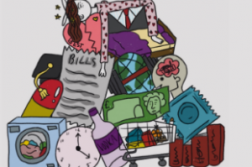It is no secret that the stereotypical student lifestyle is not exactly synonymous with great health. Whether this be because of financial issues, busy workloads, or too many post-night out takeaways, being a student at university can make it difficult to stick to a healthy lifestyle. However, there are some simple yet effective ways in which you can make your diet a bit cleaner and healthier.
Plan your meals
Meal-planning is such a useful thing to do, not only for your health, but also for your finances. It’s as simple as it sounds – simply plan out in advance what meals you are going to have for the week ahead. You can be as rigid or as flexible with this as you want, but having a rough idea of your meals will help you to make sure you are incorporating enough important nutrients in your diet, as well as eliminating food waste. Healthy, affordable and sustainable – it’s a win-win!
Make A Shopping List
We’ve all fallen victim to this: leaving Portswood Sainsburys with an overflowing shopping bag and a receipt as long as your arm, only to get home and realise that, actually, you still don’t have enough meals to last you the week…
Making a shopping list is the logical next step to meal-planning. Once you’ve worked out what you want to eat, you will be able to identify the items you need to grab during your next food shop, as well as the ones that you’ve already got in. This will save you from wandering around the supermarket aimlessly, emerging later with lots of random foods that don’t actually go together.
Learn to cook
Okay, nobody is expecting you to rival Gordon Ramsay anytime soon, but having a decent amount of healthy recipes you can cook to a good (or at least edible) standard is so useful. This will help you limit the amount of times you get a cheeky takeaway or buy an overpriced sandwich on campus. Being able to cook will also save you money on your food shop – once you’ve got a repertoire of recipes with similar staple ingredients, you can cut down your shopping list.
Keep stocked up on the essentials
There are certain non-perishable items that are just great to keep in your cupboard at all times – first of all, the obvious ones, such as baked beans, packets of pasta or tins of soup. You can also keep healthy items like pulses, which are not only cheap but also nutritious – plus, they can taste amazing when cooked right, I swear! For example, you’ll usually find a few tins of chickpeas in my cupboard (a criminally underrated food, in my opinion) – items like this are always useful to have on hand.
It is also a good idea to keep your freezer drawer stocked with frozen vegetables, for an easy way to boost the nutritional content of whatever meal you’re making – by buying frozen veg, you’ll also limit your food wastage.
Prioritise balance
Overall, the important thing to remember is that food should be enjoyed – whilst maintaining a healthy lifestyle is important, so is enjoying yourself, and consuming the foods that bring you joy and comfort.
In the name of balance – sometimes the greasy takeaway after a drunken night out is exactly the right decision. Enjoy!



